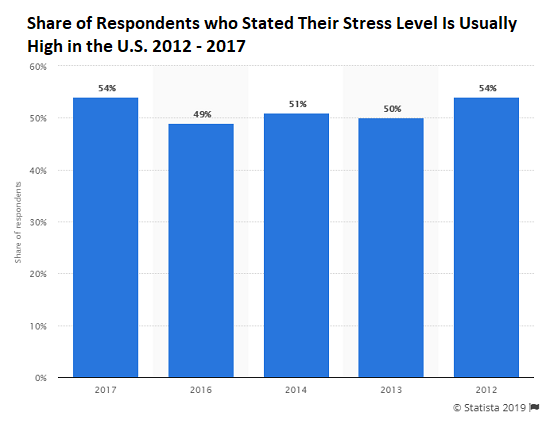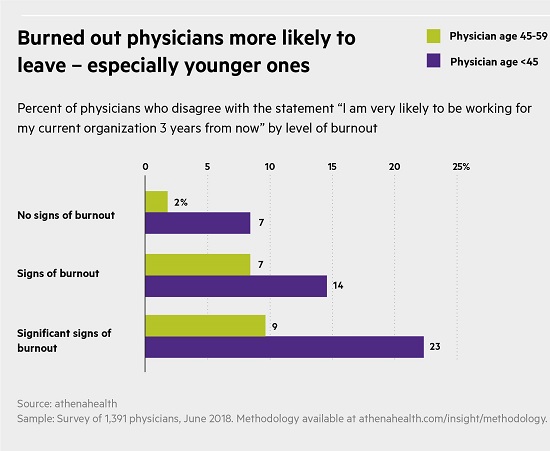Burnout Nation
May 14, 2019
The economic and financial stresses will exceed the workforce's carrying capacity in the next recession.
A number of recent surveys reflect a widespread sense of financial stress and symptoms of poor health in America's workers, particularly the younger generations. There's no real mystery as to the cause of this economic anxiety:
-- competition for secure, well-paid jobs that were once considered the birthright of the middle class is increasingly fierce;
-- the pay and predictability of the jobs that are available are low;
-- high-paying jobs are extraordinarily demanding, forcing workers to sacrifice everything else to keep the big-bucks position;
-- the much-lauded gig economy is tracking the Pareto Distribution, as 80% of the income accrues to the top 20%, and those trying to earn a lower-middle class income in the gig economy are working long hours to do so;
-- housing costs are unaffordable in hot job markets;
-- commutes to jobs from lower-cost areas are brutal;
-- student loan debt taken on to earn low-value diplomas is crushing.
These are just the highlights, not an exhaustive list of the common stresses experienced by American workers of all ages.
The inevitable result of these pressures over time is burnout, which anecdotally is reaching epidemic proportions in the U.S. and other nations.
While many of these stresses are unique to private-sector precariats in the gig economy or insecure positions in Corporate America, many public-sector workers in public safety and healthcare are also prone to burnout due to increasing workloads and understaffing.
While government agencies and Corporate America recognize the dangers to productivity posed by burnout, few agencies and companies are taking concrete actions to address the sources. Given that many of the sources are systemic, there is only so much agencies and companies can do; but what they can do may make the difference between workers free-falling into total burnout or being able to manage high levels of chronic stress.
But why should workers tolerate high levels of chronic stress? The alternative--quitting the source of the stress and finding a lower wage, lower pressure livelihood is an increasingly compelling alternative.
The status quo is purposefully blind to the systemic dangers of burnout because it depends on obedient workers producing wealth, paying taxes and taking on debt to buy more stuff. As I have noted recently, the most productive workers with digital / remote work skills have the most to gain by bailing out of the long commute / overwork / unaffordable housing rat race and establishing a lower-cost, lower stress life elsewhere.
Push Them Hard Enough and the Productive Class Will Opt Out of Servitude
Since the high-income workforce pays the lion's share of income and other taxes, a mass exodus of burned out high-productivity workers will cause shortfalls in tax revenues and in creditworthy buyers of overpriced housing in high-stress coastal urban regions.
Burnout isn't limited to highly paid workers; lower paid workers holding down multiple jobs are carrying enormous burdens of chronic stress.
The economic and financial stresses will exceed the workforce's carrying capacity in the next recession. In terms of chronic stress and economic insecurity, the recession of 2008-09 never ended for many workers; rather, the burdens have increased and the damage wrought by unrelenting stress is reaching the critical point of failure, where stress cascades into total burnout and the abandonment of jobs not by choice but by necessity.
Depression, fatigue, burnout and stress are all related, and the plethora of self-help columns aimed at relieving stress don't recognize the systemic burdens placed on workers: rather than tell overworked employees and small business owners they should meditate at 5 am before starting their commute, the entire system needs to be overhauled.


Pathfinding our Destiny: Preventing the Final Fall of Our Democratic Republic
($6.95 ebook, $12 print, $13.08
audiobook):
Read the first section for free in PDF format.
My new mystery
The Adventures of the Consulting Philosopher: The Disappearance of Drake
is a ridiculously affordable $1.29 (Kindle) or $8.95 (print);
read the first chapters
for free (PDF)
My book
Money and Work Unchained is now $6.95 for the Kindle ebook and $15 for the print edition.
Read the first section for free in PDF format.
If you found value in this content, please join me in seeking solutions by
becoming
a $1/month patron of my work via patreon.com. New benefit for subscribers/patrons:
a monthly Q&A where I respond to your questions/topics.
NOTE: Contributions/subscriptions are acknowledged in the order received. Your name and email remain confidential and will not be given to any other individual, company or agency.
|
Thank you, Jess C. ($5/month), for your superbly generous pledge to this site-- I am greatly honored by your support and readership. |

|